Description
CHAPTER ONE
INTRODUCTION
1.0 Introduction
This study on teacher‘s motivation and its effect on student‘s academic performance in selected schools was aimed at first to establish what motivates teachers in order to improve on students‘ academic performance.
Employee motivation and satisfaction have always been important issues for managers and after all, high levels of absenteeism and staff turnover which are a result of dissatisfaction can affect the organization‘s bottom line, as temps, recruitment and retraining take their toll. But few practices (in fact, few organizations) have made job satisfaction a top priority, perhaps because they have failed to understand the significant opportunity that lies in front of them. Satisfied employees tend to be more productive, creative and committed to their employers, and recent studies have shown a direct correlation between staff satisfaction and performance. Managers who can create work environments that attract, motivate and retain hard-working individuals will be better positioned to succeed in a competitive environment that demands quality and cost-efficiency.
Teachers in secondary schools are able to teach well if they work from a supportive and conducive environment. A conducive teaching environment is the one where teachers are well motivated either with monetary motivators or non-monetary motivators. It is important to note that a well motivated teacher will always teach effectively, resulting into an improved student‘s academic performance.
1.1 Background to the study
According to Pintrich & Schunk (2002), motivation is the process whereby goal-directed activity is instigated and sustained. At primary school level students need guidance and counseling, motivation and supervision to enhance their performance and to compete with their peers. Head teachers and teachers‟ motivation has strong effect on the educational attainments of students. Motivation has strong effect on educational attainments of the students and helps shape their further improvement.
According to Higbee (1996) motivation plays a very important role in the process of learning. He explains that there are two types of motivation: intrinsic motivation and extrinsic motivation. In intrinsic motivation students participate in different activities for enjoyment. In extrinsic motivation students participate in different activity only to receive a reward or to avoid punishment. These include gifts that one receives after obtaining good grades. Motivation to learn referred to the value, and benefits of academic tasks to the learner regardless of whether or not the tasks were intrinsically interesting.
Motivation involves a constellation of beliefs, perceptions, values, interests, and actions that are all closely related. As a result, various approaches to motivation can focus on cognitive behaviors (such as monitoring and strategy use), non-cognitive aspects (such as perceptions, beliefs, and attitudes), or both. Gottfried (1990) defines academic motivation as enjoyment of school learning characterized by a mastery orientation; curiosity; persistence; task endogeny; and the learning of challenging, difficult, and novel tasks. On the other hand, Turner (1995) considers motivation to be synonymous with cognitive engagement, which he defines as voluntary uses of high-level self regulated learning strategies, such as paying attention, connection, planning, and monitoring. The notion of intrinsic motivation is closely related to intrinsic value. Intrinsic motivation refers to motivation that is animated by personal enjoyment, interest, or pleasure, and is usually contrasted with extrinsic motivation, which is manipulated by reinforcement contingencies (Guay, 2010). Typically, manipulation of extrinsic motivation is effected by the provision of rewards, which can be either tangible like money, grades and privileges or intangible such as praise.
However, extrinsic motivation can come about by other means. For example, self- determination theory distinguishes several different types of regulatory mechanisms that can act as reinforcement. External regulation corresponds to the lowest level of self-determination, where behavior is motivated by a desire for reward or punishment avoidance. Educators typically consider intrinsic motivation to be more desirable than extrinsic motivation, and some research suggests that the learning outcomes of intrinsic motivation are better than those obtained under extrinsic motivation (Ryan, Connell, & Plant, 1990). According to Goldberg, Gallimore, Reese Garnier (2001), students with intrinsic motivation in academic would have higher self-perceptions of competence in academics and that students who are extrinsically motivated would have lower impact academic competence.
Harter’s Effectance motivation theory is important because it includes the effects of both success and failure on subsequent motivation. Students motivation for learning is generally regarded as one of the most critical determinants, if not the premier determinant, of the success and quality of any learning outcome. Examining the construct of intrinsic motivation in elementary school students is significant and important, because academic intrinsic motivation in the elementary years may have profound implications for initial and future school success. Students who are more intrinsically than extrinsically motivated fare better and students who are not motivated to engage in learning are unlikely to succeed (Gottfried & Gelman, 2004). Gottfried and Gelman (2004) found positive correlations between motivation and achievement.
Specifically, young students with higher academic intrinsic motivation had significantly higher achievement and intellectual performance. She also found that early intrinsic motivation correlates with later motivation and achievement and that later motivation is predictable from early achievement (Gottfried and Gelman 2004). It was also found that impact of academic competence was positively related to intrinsic motivation. It seems that students who feel competent and self-determined in the school context develop an autonomous motivational profile toward education, which in turn leads them to obtain higher school grades. Impact academic competence and impact academic self-determination positively impact autonomous academic motivation, which in turn had a positive impact on school performance.
Teachers‘ motivation differs from teachers‘ satisfaction in the way that the former is the drive to satisfy a want or achieve an outcome; whereas the later is experienced when the outcome has been achieved. Therefore it should be asserted that teacher‘ motivation results into teachers‘ satisfaction and therefore improved teachers‘ performance. At the place of work managers motivate their subordinates to satisfy the employee‘s drives and desires and this induces them to act in a desired manner. The operational definition of motivation in this study is that motivation is what drives the employees‘ (teachers) to generate results for the organization (School). In this understanding the employees may not find all their tasks interesting or rewarding, but they hold the belief on how those tasks are essential to the overall processes that make the organization succeed.
Teachers‘ Performance is the practice of doing something well without wastage of time or money. Paul (1994.165) defines it as the relationship between organizations’ use of its resources and its productive outputs and emphases that performance is the optimum use of available resources and achievement of maximum level of production. Mbiti (1984) noted that, performance is the actual generation of profit or the satisfaction of organizational short term and long term needs. For every teacher to achieve the set goals there is need to emphasize planning, coordination and supervision of activities through a stakeholder agreed framework.
In this contemporary world, the cardinal force behind school performance is motivation. According to Balunywa (2003), motivation is the inducement of a desired behavior with in subordinates. If it is inducement of a desired behaviour within subordinates, then, teacher‘s motivation is described as having the capabilities to do the following:- optimize academic learning time, reward achievements in appropriate ways, utilize interactive teaching practices, hold and communicate high expectations for student performance and select and use appropriate types of instructions.
1.2 Problem statement
Despite several efforts of the present government of Nigeria and efforts of the several educators to encourage rural schools to improve on their academic performances, like posting trained teachers, providing textbooks to schools and paying teachers‘ salaries, there is still concern that academic performance in Benue secondary schools is generally poor.
Usually the students‘ academic performance may get improved when the teachers are tuned up to their teaching profession. There are number of things to tune if teachers are to perform among others, teaching facilities should be in place, there should be good teachers‘ interpersonal relationships and above all teachers‘ motivation should be catered for in all aspects. However, the passed years there has been some concern in secondary schools in Benue State where by a student‘s academic performance has tremendously declined and the stakeholders has attributed these to a number of reasons.
Many have asserted that teachers motivation is not up to the standards and therefore this has affected students‘ performance. It‘s against this background that the researcher has been motivated to investigate how the teachers‘ motivation has affected student‘s academic performance in Benue State.
1.3 Purpose of the study
The study examined the impact teachers‘ motivation has on students‘ academic performance in selected secondary schools.
1.4 Objectives of the study
The study was guided by the following objectives:
- To find out the effect of Teachers‘ monetary motivation on students‘ academic Performance in secondary schools in Benue State.
- To assess the effect of Teachers‘ non-monetary motivation on students‘ academic Performance in secondary schools in Benue State.
- To find out the relationship between Teachers‘ monetary and non-monetary Motivators on students‘ academic performance in secondary schools in Benue State.
1.5 Research questions
The following research questions were investigated:
- How do teachers‘ monetary motivators such as salaries and allowances affect students‘ academic performance in secondary schools in Benue state?
- Is students‘ academic performance dependent on teachers‘ non-monetary motivators such as recognition, achievement, and responsibility held, work prospects, promotions, staff development?
- Is there any relationship between teachers‘ monetary motivators, teachers‘ non-monetary motivators and students‘ academic performance in secondary schools in Benue state?
1.6 Scope of the study
The study was carried out in Benue state, in selected government owned schools.
The content scope of the study covered the effect of monetary motivators, non-monitors and academic performance as well as the relationship between monetary and non-monetary motivators on students ‘ academic performance in secondary schools in Benue state.
1.7 Significance of the study
- The study investigated the effects of teachers‘ motivation on the students‘ academic performance in secondary schools in Benue state and it was intended to benefit stakeholders like the parents, students teachers, school administrators, policy makers in the Ministry of Education who are assumed to benefit either directly or indirectly from the motivation of teachers.
- As a result of this study the stakeholders in education especially the parents, head teachers and the Ministry of Education officials can realize that teachers‘ motivation improves on students‘ academic performance at schools.
- From this study, Education administrators can be adequately believed that both the monitory and non monitory motivators are important.
- The education administrators should understand that teachers‘ monetary motivators should be revised from time to time since overtime money depreciates value due to inflationary tendencies.

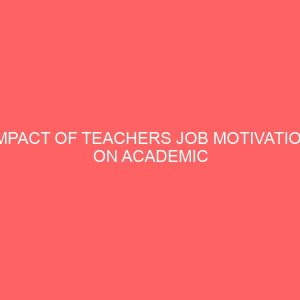
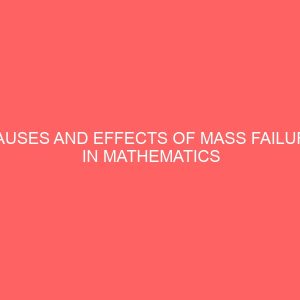

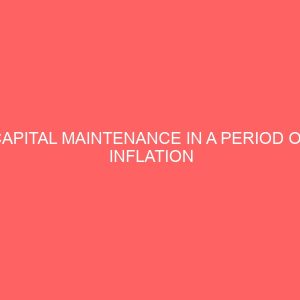
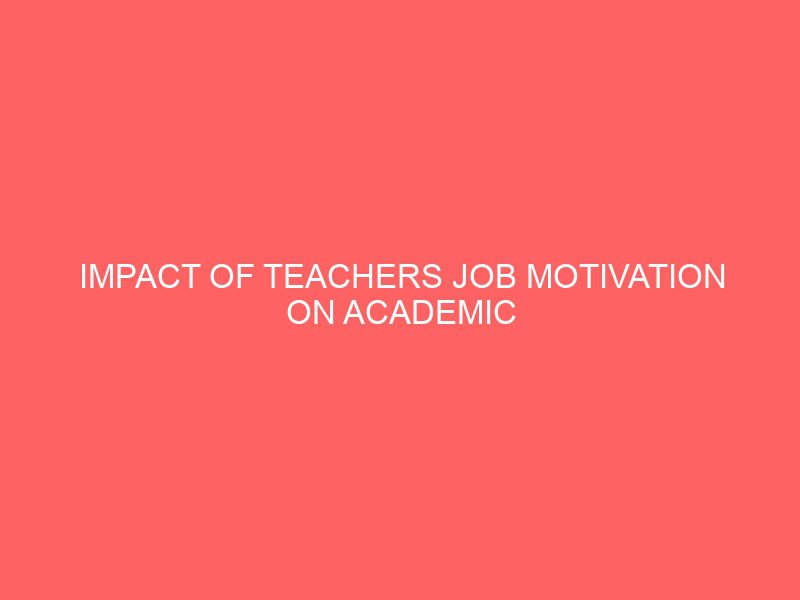
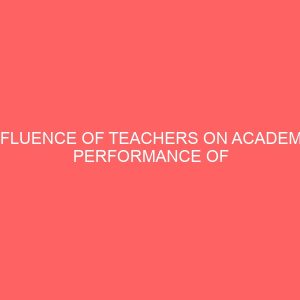
Reviews
There are no reviews yet.